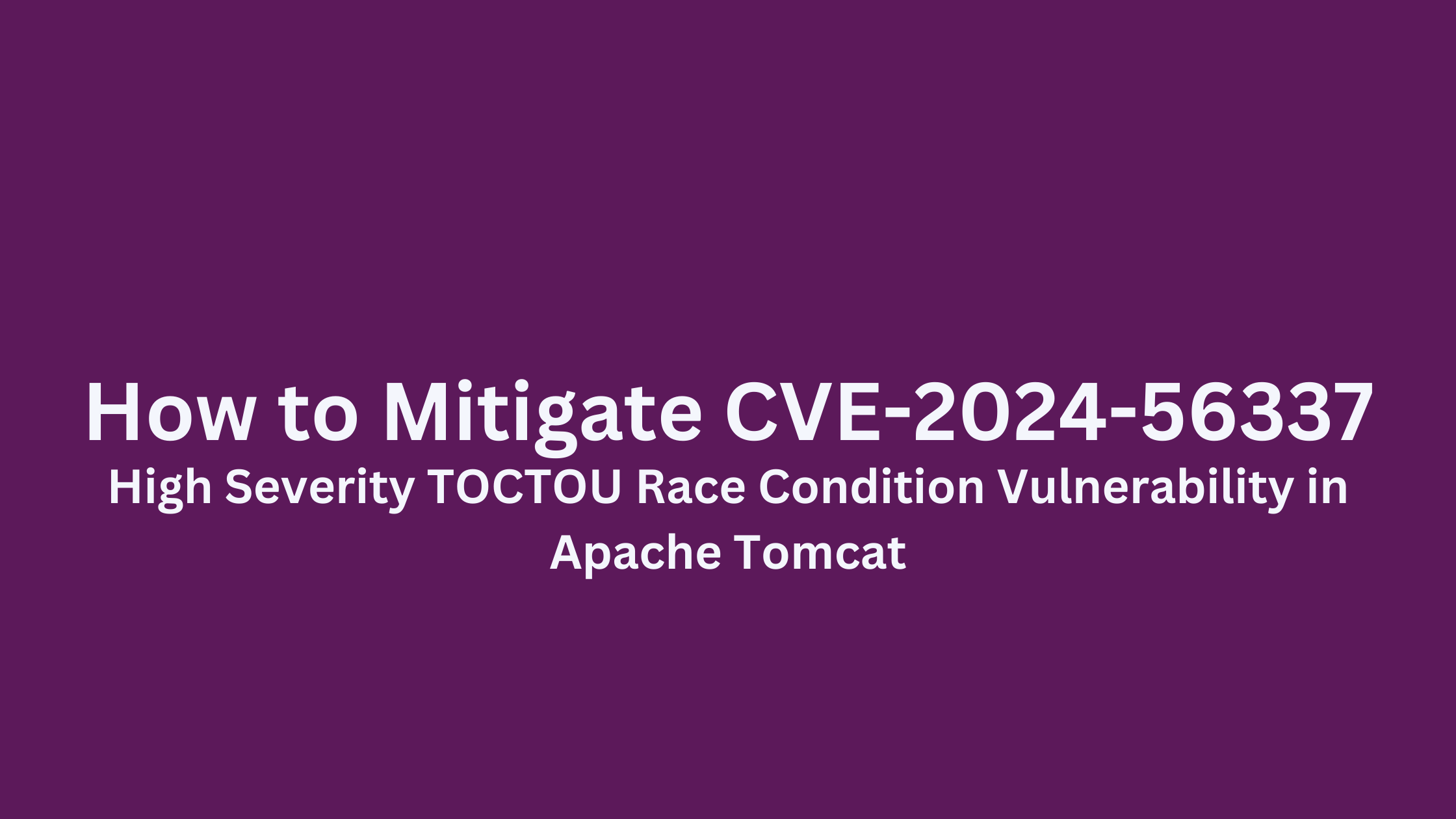Table of Contents
How to Mitigate CVE-2024-56337 - A TOCTOU Race Condition Vulnerability in Apache Tomcat?
Apache Tomcat, a widely used open-source Java servlet container, has recently been found vulnerable to a critical Time-of-check Time-of-use (TOCTOU) race condition vulnerability that could potentially compromise system security. This vulnerability, tracked as CVE-2024-56337, affects multiple versions of Apache Tomcat and requires immediate attention from security professionals and system administrators managing web applications and infrastructure.
Introduction to Apache Tomcat
Apache Tomcat is an open-source Java servlet and JavaServer Pages (JSP) web server developed by the Apache Software Foundation. It provides a robust, production-grade environment for running Java web applications and is widely used across enterprise and web hosting environments. As a critical component of many Java-based web infrastructures, ensuring its security is paramount for maintaining the integrity and confidentiality of web services.
Summary of the Vulnerability
CVE ID: CVE-2024-56337
Description: Time-of-check Time-of-use (TOCTOU) Race Condition vulnerability
CVSS Score: 8.1
CVSS Vector: CVSS:3.1/AV:N/AC:H/PR:N/UI:N/S:U/C:H/I:H/A:H
The vulnerability stems from an incomplete mitigation of a previous security flaw (CVE-2024-50379). It specifically affects Apache Tomcat installations running on case-insensitive file systems with the default servlet write enabled. The race condition can potentially allow attackers to exploit file system interactions, leading to significant security risks.
Impact of the Vulnerability
This Time-of-check Time-of-use (TOCTOU) race condition vulnerability represents a critical security risk for Apache Tomcat deployments. With a high CVSS score of 8.1, the vulnerability could enable attackers to:
Bypass intended file system access controls
Potentially execute unauthorized file modifications
Compromise system integrity and confidentiality
Exploit race conditions in file system interactions
The vulnerability's complexity and potential impact underscore the importance of prompt remediation and careful configuration management.
Products Affected by the Vulnerability
|
Product
|
Affected Versions
|
|---|---|
|
Apache Tomcat
|
11.0.0-M1 to 11.0.1
|
|
Apache Tomcat
|
10.1.0-M1 to 10.1.33
|
|
Apache Tomcat
|
9.0.0.M1 to 9.0.97
|
How to Check Your Product is Vulnerable?
To determine if your Apache Tomcat installation is vulnerable:
Verify your Apache Tomcat version
Check if you're running on a case-insensitive file system
Confirm if the default servlet write is enabled (readonly parameter set to false)
Review Java version compatibility with the vulnerability
How to Fix the Vulnerability?
Mitigation strategies depend on your specific Java version:
Upgrade Recommendation:
Upgrade to Apache Tomcat 11.0.2 or later
Upgrade to Apache Tomcat 10.1.34 or later
Upgrade to Apache Tomcat 9.0.98 or later
2. Java-Specific Configurations:
Java 8 or Java 11: Explicitly set sun.io.useCanonCaches to false
Java 17: Ensure sun.io.useCanonCaches is set to false if configured
Java 21 onwards: No additional configuration required
3. Additional Mitigation Steps:
Disable write access for the default servlet if not required
Implement strict access controls
Monitor system logs for suspicious activities
Conclusion
CVE-2024-56337 presents a significant security challenge for Apache Tomcat deployments. Security professionals must prioritize upgrading to patched versions and carefully configuring their systems to mitigate potential exploitation risks.
Proactive patch management, thorough testing, and continuous monitoring are crucial in maintaining the security of Apache Tomcat environments.
Found this article interesting? Keep visiting thesecmaster.com, and our social media page on Facebook, LinkedIn, Twitter, Telegram, Tumblr, Medium, and Instagram and subscribe to receive tips like this.
You may also like these articles:
Arun KL
Arun KL is a cybersecurity professional with 15+ years of experience in IT infrastructure, cloud security, vulnerability management, Penetration Testing, security operations, and incident response. He is adept at designing and implementing robust security solutions to safeguard systems and data. Arun holds multiple industry certifications including CCNA, CCNA Security, RHCE, CEH, and AWS Security.
